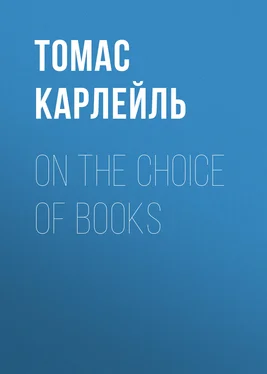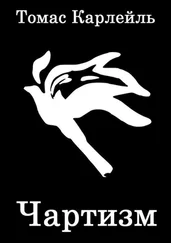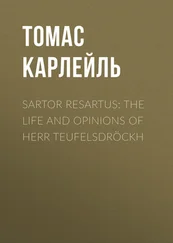Томас Карлейль - On the Choice of Books
Здесь есть возможность читать онлайн «Томас Карлейль - On the Choice of Books» — ознакомительный отрывок электронной книги совершенно бесплатно, а после прочтения отрывка купить полную версию. В некоторых случаях можно слушать аудио, скачать через торрент в формате fb2 и присутствует краткое содержание. Жанр: foreign_prose, Культурология, literature_19, foreign_edu, foreign_antique, на английском языке. Описание произведения, (предисловие) а так же отзывы посетителей доступны на портале библиотеки ЛибКат.
- Название:On the Choice of Books
- Автор:
- Жанр:
- Год:неизвестен
- ISBN:нет данных
- Рейтинг книги:3 / 5. Голосов: 1
-
Избранное:Добавить в избранное
- Отзывы:
-
Ваша оценка:
- 60
- 1
- 2
- 3
- 4
- 5
On the Choice of Books: краткое содержание, описание и аннотация
Предлагаем к чтению аннотацию, описание, краткое содержание или предисловие (зависит от того, что написал сам автор книги «On the Choice of Books»). Если вы не нашли необходимую информацию о книге — напишите в комментариях, мы постараемся отыскать её.
On the Choice of Books — читать онлайн ознакомительный отрывок
Ниже представлен текст книги, разбитый по страницам. Система сохранения места последней прочитанной страницы, позволяет с удобством читать онлайн бесплатно книгу «On the Choice of Books», без необходимости каждый раз заново искать на чём Вы остановились. Поставьте закладку, и сможете в любой момент перейти на страницу, на которой закончили чтение.
Интервал:
Закладка:
In the year 1822 he made a translation of "Legendre's Geometry," to which he prefixed an Essay on Proportion; and the book appeared a year or two afterwards under the auspices of the late Sir David Brewster. 4 4 "Elements of Geometry and Trigonometry," with Notes. Translated from the French of A.M. Legendre. Edited by David Brewster, LL.D. With Notes and Additions, and an Introductory Chapter on Proportion. Edinburgh: published by Oliver and Boyd; and G. and W.B. Whittaker, London. 1824, pp. xvi., 367. Sir David Brewster's Preface, in which he speaks of "an Introduction on Proportion, by the Translator," is dated Edinburgh, August 1, 1822.
The Essay on Proportion remains to this day the most lucid and succinct exposition of the subject hitherto published.
"I was already," says Carlyle in his Reminiscences , "getting my head a little up, translating 'Legendre's Geometry' for Brewster. I still remember a happy forenoon in which I did a Fifth Book (or complete 'doctrine of proportion') for that work, complete really and lucid, and yet one of the briefest ever known. It was begun and done that forenoon, and I have (except correcting the press next week) never seen it since; but still I feel as if it were right enough and felicitous in its kind! I only got £50 for my entire trouble in that 'Legendre;' but it was an honest job of work, honestly done." 5 5 Reminiscences by Thomas Carlyle , Edited by James Anthony Froude. London: Longmans, Green and Co., 1881, Vol. 1., pp. 198-199.
The late Professor de Morgan—an excellent authority—pronounced a high eulogium upon this Essay on Proportion.
In 1822 Carlyle accepted the post of tutor to Charles Buller, of whose early death and honourable promise, two touching records remain to us, one in verse by Thackeray, and one in prose by Carlyle.
For the next four years Carlyle devoted his attention almost exclusively to German literature.
His Life of Schiller first appeared under the title of "Schiller's Life and Writings," in the London Magazine.
Part I.—October, 1823. Part II.—January, 1824. Part III.—July, 1824. " August, 1824. " September, 1824.
It was enlarged, and separately published by Messrs. Taylor and Hessey, the proprietors of the Magazine, in 1825.
The translation of "Wilhelm Meister," in 1824, 6 6 Wilhelm Meister's Apprenticeship. 3 Vols., Edinburgh, 1824.
was the first real introduction of Goethe to the reading world of Great Britain. It appeared without the name of the translator, but its merits were too palpable to be overlooked, though some critics objected to the strong infusion of German phraseology which had been imported into the English version. This acquired idiom never left our author, even in his original works, although the "Life of Schiller," written but a few months before, is almost entirely free from the peculiarity. "Wilhelm Meister," in its English dress, was better received by the English reading public than by English critics. De Quincey, in one of his dyspeptic fits, fell upon the book, its author, and the translator, 7 7 Curiously enough in the very numbers of the "London Magazine" containing the later instalments of Carlyle's Life of Schiller.
and Lord Jeffrey, in the Edinburgh Review, although admitting Carlyle to be a talented person, heaped condemnation upon the work.
Carlyle's next work was a series of translations, entitled "German Romance: Specimens of the chief Authors; with Biographical and Critical Notices." 4 vols. Edinburgh, 1827. The Preface and Introductions are reprinted in the second volume of Carlyle's Collected Works: the Specimens translated from Hoffmann and La Motte Fouqué, have not been reprinted.
"This," says Carlyle, in 1857, "was a Book of Translations, not of my suggesting or desiring, but of my executing as honest journey-work in defect of better. The pieces selected were the suitablest discoverable on such terms: not quite of less than no worth (I considered) any piece of them; nor, alas, of a very high worth any, except one only. Four of these lots, or quotas to the adventure, Musæus's, Tieck's, Richter's, Goethe's, will be given in the final stage of this Series; the rest we willingly leave, afloat or stranded, as waste driftwood, to those whom they may farther concern."
It was in 1826 that Mr. Carlyle married Miss Jane Welsh, the only child of Dr. John Welsh, of Haddington, 8 8 Her father had been dead some seven years when Carlyle and she were married, and the life interest of her inheritance in the farm of Craigenputtoch had been made over to her mother, who survived until 1842, when it reverted to Carlyle.
a lineal descendant of John Knox, and a lady fitted in every way to be the wife of such a man. For some time after marriage he continued to reside at Edinburgh, but in May, 1828, he took up his residence in his native county, at Craigenputtoch—a solitary farmhouse on a small estate belonging to his wife's mother, about fifteen miles from Dumfries, and in one of the most secluded parts of the country. Most of his letters to Goethe were written from this place.
In one of the letters sent from Craigenputtoch to Weimar, bearing the date of 25th September, 1828, we have a charming picture of our author's seclusion and retired literary life at this period:—
"You inquire with such warm interest respecting our present abode and occupations, that I feel bound to say a few words about both, while there is still room left. Dumfries is a pleasant town, containing about fifteen thousand inhabitants, and may be considered the centre of the trade and judicial system of a district which possesses some importance in the sphere of Scottish industry. Our residence is not in the town itself, but fifteen miles to the north-west, among the granite hills and the black morasses which stretch westward through Galloway, almost to the Irish Sea. In this wilderness of heath and rock, our estate stands forth a green oasis, a tract of ploughed, partly enclosed, and planted ground, where corn ripens, and trees afford a shade, although surrounded by sea-mews and rough-woolled sheep. Here, with no small effort, have we built and furnished a neat, substantial dwelling; here, in the absence of professorial or other office, we live to cultivate literature according to our strength, and in our own peculiar way. We wish a joyful growth to the rose and flowers of our garden; we hope for health and peaceful thoughts to further our aims. The roses, indeed, are still in part to be planted, but they blossom already in anticipation. Two ponies, which carry us everywhere, and the mountain air, are the best medicines for weak nerves. This daily exercise—to which I am much devoted—is my only recreation: for this nook of ours is the loneliest in Britain—six miles removed from any one likely to visit me. Here Rousseau would have been as happy as on his island of St. Pierre. My town friends, indeed, ascribe my sojourn here to a similar disposition, and forbode me no good result. But I came hither solely with the design to simplify my way of life, and to secure the independence through which I could be enabled to remain true to myself. This bit of earth is our own; here we can live, write, and think, as best pleases ourselves, even though Zoilus himself were to be crowned the monarch of literature. Nor is the solitude of such great importance; for a stage-coach takes us speedily to Edinburgh, which we look upon as our British Weimar. And have I not, too, at this moment piled up upon the table of my little library a whole cart-load of French, German, American, and English journals and periodicals—whatever may be their worth? Of antiquarian studies, too, there is no lack. From some of our heights I can descry, about a day's journey to the west, the hill where Agricola and his Romans left a camp behind them. At the foot of it I was born, and there both father and mother still live to love me. And so one must let time work."
Читать дальшеИнтервал:
Закладка:
Похожие книги на «On the Choice of Books»
Представляем Вашему вниманию похожие книги на «On the Choice of Books» списком для выбора. Мы отобрали схожую по названию и смыслу литературу в надежде предоставить читателям больше вариантов отыскать новые, интересные, ещё непрочитанные произведения.
Обсуждение, отзывы о книге «On the Choice of Books» и просто собственные мнения читателей. Оставьте ваши комментарии, напишите, что Вы думаете о произведении, его смысле или главных героях. Укажите что конкретно понравилось, а что нет, и почему Вы так считаете.












